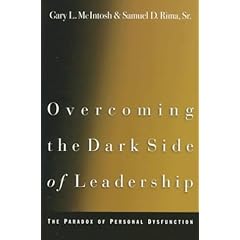Overcoming the Dark Side of Leadership: The Passive-Aggressive Leader
Jonah was a reluctant disobedient leader who did what he did with the wrong attitude.
• Stubborn
• Forgetful
• Intentionally inefficient
• Tend to complain
• Resist demands, procrastinate
• Dawdle as a means of controlling their environment and those around them
• On occasion they will exert control through the use of short outbursts of sadness or anger
• They are angry and bitter as well as fearful of success since it will lead to higher expectations
Mark the following:
5 = strongly agree
4 = agree
3 = uncertain
2 = disagree
1 = strongly disagree
• I find myself resisting standards and procedures for formal review of my performance.
• It is common for me to procrastinate on major projects.
• I regularly resist other’s ideas that could translate into increased performance or responsibilities for myself.
• I find myself consistently under-performing.
• I experience periodic but regular outbursts of anger and frustration that are just within the bounds of what is considered acceptable behavior.
• Occasionally I intentionally forget suggested projects.
• Sometimes I give others the silent treatment as an expression of my anger.
• I find myself telling others that nothing is bothering me when in reality I am seething.
• I tend to be generally pessimistic and feel negative about my future.
• Others have expressed to me that I make them feel uncomfortable.
• Strategic planning and goal-setting are difficult for me.
• Sometimes I catch myself trying to manipulate others in group settings by venting my anger and emotions when facing an initiative or idea I do not support.
• Stubborn
• Forgetful
• Intentionally inefficient
• Tend to complain
• Resist demands, procrastinate
• Dawdle as a means of controlling their environment and those around them
• On occasion they will exert control through the use of short outbursts of sadness or anger
• They are angry and bitter as well as fearful of success since it will lead to higher expectations
Mark the following:
5 = strongly agree
4 = agree
3 = uncertain
2 = disagree
1 = strongly disagree
• I find myself resisting standards and procedures for formal review of my performance.
• It is common for me to procrastinate on major projects.
• I regularly resist other’s ideas that could translate into increased performance or responsibilities for myself.
• I find myself consistently under-performing.
• I experience periodic but regular outbursts of anger and frustration that are just within the bounds of what is considered acceptable behavior.
• Occasionally I intentionally forget suggested projects.
• Sometimes I give others the silent treatment as an expression of my anger.
• I find myself telling others that nothing is bothering me when in reality I am seething.
• I tend to be generally pessimistic and feel negative about my future.
• Others have expressed to me that I make them feel uncomfortable.
• Strategic planning and goal-setting are difficult for me.
• Sometimes I catch myself trying to manipulate others in group settings by venting my anger and emotions when facing an initiative or idea I do not support.
Overcoming the Dark Side of Leadership: The Codependant Leader
The Biblical character is Samson, he was a man with a need.
They are:
• Peacemakers who cover up problems rather than face them
• May have high tolerance for deviant behavior
• Willing to take on more work so they do not have to tell anyone no
• React rather than act
• They are repressed and frustrated people who cannot give full expression to their emotions or problems
Mark the following:
5 = strongly agree
4 = agree
3 = uncertain
2 = disagree
1 = strongly disagree
• I grew up in a family with one or more chemically dependent people (i.e., alcoholics, drug addicts, etc.).
• I grew up in a strict, legalistic religious environment that held its members to an unrealistic standard of behavior and discouraged open communication about personal struggles and problems.
• I am usually willing to put up with the bizarre or embarrassing behavior of others.
• I often refrain from sharing my opinion in a group setting until I have heard the opinions of the others in the group.
• I frequently worry about hurting people’s feelings by sharing my true feelings.
• I often feel responsible for problems I did not create.
• I find it difficult to sleep because I worry about someone else’s problems or behavior.
• I find myself frequently over-committed and feel my life is out of control.
• I find it extremely difficult to say no to people even when I know that saying yes will result in difficulty for me or my family.
• I constantly feel a sense of guilt but have difficulty identifying its source.
• I feel like I never measure up to those around me and have self-deprecating thoughts.
• When I receive compliments from others, I find it difficult to simply accept them without making qualifying statements.
Next Week: The Passive-Aggressive Leader
They are:
• Peacemakers who cover up problems rather than face them
• May have high tolerance for deviant behavior
• Willing to take on more work so they do not have to tell anyone no
• React rather than act
• They are repressed and frustrated people who cannot give full expression to their emotions or problems
Mark the following:
5 = strongly agree
4 = agree
3 = uncertain
2 = disagree
1 = strongly disagree
• I grew up in a family with one or more chemically dependent people (i.e., alcoholics, drug addicts, etc.).
• I grew up in a strict, legalistic religious environment that held its members to an unrealistic standard of behavior and discouraged open communication about personal struggles and problems.
• I am usually willing to put up with the bizarre or embarrassing behavior of others.
• I often refrain from sharing my opinion in a group setting until I have heard the opinions of the others in the group.
• I frequently worry about hurting people’s feelings by sharing my true feelings.
• I often feel responsible for problems I did not create.
• I find it difficult to sleep because I worry about someone else’s problems or behavior.
• I find myself frequently over-committed and feel my life is out of control.
• I find it extremely difficult to say no to people even when I know that saying yes will result in difficulty for me or my family.
• I constantly feel a sense of guilt but have difficulty identifying its source.
• I feel like I never measure up to those around me and have self-deprecating thoughts.
• When I receive compliments from others, I find it difficult to simply accept them without making qualifying statements.
Next Week: The Passive-Aggressive Leader
Overcoming the Dark Side of Leadership: The Paranoid Leader
Saul was such a leader. He took the priestly rights into his own hands. He prohibited the men from eating before battle, he failed to utterly destroy Amalek and refused to acknowledge any
disobedience. Saul feared David’s popularity. Saul’s neurotic activities led to his own breakdown and failure.
Paranoid leaders are:
Like Saul, jealous and suspicious of David and his rising popularity.
• Suspicious, hostile and guarded in their relationships with others
• Because of being jealous they are deeply insecure in their own abilities,
• Overreact to the mildest forms of criticism
• Often create rigid structures and systems of control
• Demand excessive reporting
• At the heart is strong feelings of insecurity and a lack of confidence
Mark the following:
5 = strongly agree
4 = agree
3 = uncertain
2 = disagree
1 = strongly disagree
• When I see two key church leaders discreetly talking in the lobby of the church, I worry that they may be talking about me.
• It really bothers me to think about my church’s board meeting without me being present.
• When an associate receives rave reviews for a sermon or some special ministry, I experience intense feelings of jealousy rather than joy in the success and recognition he or she is receiving.
• I require subordinates and associates to provide me with detailed reports of their activities.
• I struggle when an associate, rather than me, is asked by church members to perform services such as weddings or funerals.
• I have few intimate or meaningful relationships within my church or organization and find myself avoiding such relationships.
• I insist on absolute loyalty form those who work for me and prohibit staff from criticizing me in any way.
• I often worry that there is a significant faction within my organization that would like to see me leave.
• I have probed people for what they know or for special information they may have relating to certain leaders in my organization.
• Those I work with often complain about my lack of a healthy sense of humor.
• I routinely refer to those I lead as “my people,” “my board,” or “my church,” while bristling when the same designation is spoken by an associate.
• I tend to take seriously even lighthearted comments and jokes directed at me.
Next Week: The Codependent Leader
disobedience. Saul feared David’s popularity. Saul’s neurotic activities led to his own breakdown and failure.
Paranoid leaders are:
Like Saul, jealous and suspicious of David and his rising popularity.
• Suspicious, hostile and guarded in their relationships with others
• Because of being jealous they are deeply insecure in their own abilities,
• Overreact to the mildest forms of criticism
• Often create rigid structures and systems of control
• Demand excessive reporting
• At the heart is strong feelings of insecurity and a lack of confidence
Mark the following:
5 = strongly agree
4 = agree
3 = uncertain
2 = disagree
1 = strongly disagree
• When I see two key church leaders discreetly talking in the lobby of the church, I worry that they may be talking about me.
• It really bothers me to think about my church’s board meeting without me being present.
• When an associate receives rave reviews for a sermon or some special ministry, I experience intense feelings of jealousy rather than joy in the success and recognition he or she is receiving.
• I require subordinates and associates to provide me with detailed reports of their activities.
• I struggle when an associate, rather than me, is asked by church members to perform services such as weddings or funerals.
• I have few intimate or meaningful relationships within my church or organization and find myself avoiding such relationships.
• I insist on absolute loyalty form those who work for me and prohibit staff from criticizing me in any way.
• I often worry that there is a significant faction within my organization that would like to see me leave.
• I have probed people for what they know or for special information they may have relating to certain leaders in my organization.
• Those I work with often complain about my lack of a healthy sense of humor.
• I routinely refer to those I lead as “my people,” “my board,” or “my church,” while bristling when the same designation is spoken by an associate.
• I tend to take seriously even lighthearted comments and jokes directed at me.
Next Week: The Codependent Leader
Overcoming the Dark Side of Leadership: The Narcissistic Leader
Narcissus was a mythical Greek who was so absorbed with himself that when he looked at his reflection in a pool he could not leave.
Solomon was this kind of leader. He accumulated for his own glory and grandeur.
Narcissistic leaders:
• Tend to overestimate their own achievements and abilities while stubbornly refusing to recognize the quality and value of the same in others
• Recognition of someone else’s accomplishments or abilities is a threat to their own self-importance
• They use others to advance themselves so are notorious for being unable to empathize with those they lead
• They are driven to succeed by a need for admiration and acclaim
• They are self-absorbed and have deep feelings of inferiority
• They may not enjoy their success and may be dissatisfied with their lives
Mark the following:
5 = strongly agree
4 = agree
3 = uncertain
2 = disagree
1 = strongly disagree
• Fellow leaders in my church or organization frequently question whether my proposed goals and projects are feasible and realistic.
• I am obsessed with knowing how others feel about my sermons, lessons, and performance.
• I find it difficult to receive criticism of any kind, reacting with anger, anxiety, or even depression when it does come.
• At times I find myself thinking, I’ll show them; they could never make it without me, when I experience conflict situations or opposition to my proposed plans.
• In spite of achieving what others would consider significant success, I still find myself dissatisfied and driven to achieve greater things in an effort to feel good about myself.
• I am willing to bend rules and press the envelope of acceptable behavior to accomplish my goals.
• I find myself feeling jealous of the success and achievements of associates, other churches, or organizations in my area.
• I am often unaware of or unconcerned about the financial pressures my goals and projects place on those I lead or the church or organization I serve.
• Success or failure in a project has a direct bearing on my self-image and sense of worth.
• I am highly conscious of how colleagues and those to whom I am accountable regard my accomplishments.
• I need to be recognized or “on top” when meeting with a group of fellow pastors, denominational officials, or associates.
• I see myself as a nationally known figure at some time in the future or I have plans to attain such a position.
Next Week: The Paranoid Leader
Solomon was this kind of leader. He accumulated for his own glory and grandeur.
Narcissistic leaders:
• Tend to overestimate their own achievements and abilities while stubbornly refusing to recognize the quality and value of the same in others
• Recognition of someone else’s accomplishments or abilities is a threat to their own self-importance
• They use others to advance themselves so are notorious for being unable to empathize with those they lead
• They are driven to succeed by a need for admiration and acclaim
• They are self-absorbed and have deep feelings of inferiority
• They may not enjoy their success and may be dissatisfied with their lives
Mark the following:
5 = strongly agree
4 = agree
3 = uncertain
2 = disagree
1 = strongly disagree
• Fellow leaders in my church or organization frequently question whether my proposed goals and projects are feasible and realistic.
• I am obsessed with knowing how others feel about my sermons, lessons, and performance.
• I find it difficult to receive criticism of any kind, reacting with anger, anxiety, or even depression when it does come.
• At times I find myself thinking, I’ll show them; they could never make it without me, when I experience conflict situations or opposition to my proposed plans.
• In spite of achieving what others would consider significant success, I still find myself dissatisfied and driven to achieve greater things in an effort to feel good about myself.
• I am willing to bend rules and press the envelope of acceptable behavior to accomplish my goals.
• I find myself feeling jealous of the success and achievements of associates, other churches, or organizations in my area.
• I am often unaware of or unconcerned about the financial pressures my goals and projects place on those I lead or the church or organization I serve.
• Success or failure in a project has a direct bearing on my self-image and sense of worth.
• I am highly conscious of how colleagues and those to whom I am accountable regard my accomplishments.
• I need to be recognized or “on top” when meeting with a group of fellow pastors, denominational officials, or associates.
• I see myself as a nationally known figure at some time in the future or I have plans to attain such a position.
Next Week: The Paranoid Leader
Overcoming the Dark Side of Leadership: Compulsive Leader
Moses was a compulsive leader, his need to control caused his father-in-law to re-arrange his case load. Moses also was prone to occasional outbursts of anger.
A compulsive leader:
• needs to maintain absolute order
• pursues perfection to the extreme
• live rigid, highly systematized daily routines that they must follow meticulously
• are status conscious, as such they seek to impress their superiors with their diligence and efficiency
• they continually look for the reassurance and approval of authority figures
• these pressures cause them to become workaholics
• they see staff as slackers if they don’t keep pace
• there is little room for spontaneity, even recreation and relaxation time is planned well in advance
• on the outside they are pictures of absolute order, on the inside they are an emotional powder keg
• this rigid personality can come from rigid childhood environments where unrealistic expectation were place on
• this repressed anger can suddenly erupt
• attempts to exercise and maintain control of their lives and environments are efforts to keep repressed anger, resentment, and rebellion from surfacing
Mark the following:
5 = strongly agree
4 = agree
3 = uncertain
2 = disagree
1 = strongly disagree
• I often worry that my superiors do not approve of the quality of my work.
• I am highly regimented in my daily personal routines such as exercise schedule or devotions.
• When circumstances dictate that I must interrupt my daily personal routines, I find myself out of sorts and feeling guilty for having “skipped” a day.
• I frequently find myself conscious of my status in relationship to others.
• It is difficult for me to take an unplanned day off from work responsibilities just to goof around or spend time with friends or family.
• While away from work, I still find myself thinking about work-related topics, often sitting down to write out my ideas in length even if it disrupts family activities.
• I like to plan the details of my vacations so that I don’t waste time.
• I often explode in anger after being cut off or irritated while driving or over petty issues.
• I am meticulous with my personal appearance, keeping shoes shined, clothes perfectly pressed, hair carefully cut and groomed, and fingernails always clipped.
• I frequently comment about the long hours I keep and my heavy workload.
• When others make sloppy errors or pay little attention to detail, I become annoyed and judge that person.
• I am obsessive about the smallest errors, worrying that they will reflect poorly on me.
Next week: The Narcissistic Leader
A compulsive leader:
• needs to maintain absolute order
• pursues perfection to the extreme
• live rigid, highly systematized daily routines that they must follow meticulously
• are status conscious, as such they seek to impress their superiors with their diligence and efficiency
• they continually look for the reassurance and approval of authority figures
• these pressures cause them to become workaholics
• they see staff as slackers if they don’t keep pace
• there is little room for spontaneity, even recreation and relaxation time is planned well in advance
• on the outside they are pictures of absolute order, on the inside they are an emotional powder keg
• this rigid personality can come from rigid childhood environments where unrealistic expectation were place on
• this repressed anger can suddenly erupt
• attempts to exercise and maintain control of their lives and environments are efforts to keep repressed anger, resentment, and rebellion from surfacing
Mark the following:
5 = strongly agree
4 = agree
3 = uncertain
2 = disagree
1 = strongly disagree
• I often worry that my superiors do not approve of the quality of my work.
• I am highly regimented in my daily personal routines such as exercise schedule or devotions.
• When circumstances dictate that I must interrupt my daily personal routines, I find myself out of sorts and feeling guilty for having “skipped” a day.
• I frequently find myself conscious of my status in relationship to others.
• It is difficult for me to take an unplanned day off from work responsibilities just to goof around or spend time with friends or family.
• While away from work, I still find myself thinking about work-related topics, often sitting down to write out my ideas in length even if it disrupts family activities.
• I like to plan the details of my vacations so that I don’t waste time.
• I often explode in anger after being cut off or irritated while driving or over petty issues.
• I am meticulous with my personal appearance, keeping shoes shined, clothes perfectly pressed, hair carefully cut and groomed, and fingernails always clipped.
• I frequently comment about the long hours I keep and my heavy workload.
• When others make sloppy errors or pay little attention to detail, I become annoyed and judge that person.
• I am obsessive about the smallest errors, worrying that they will reflect poorly on me.
Next week: The Narcissistic Leader
Overcoming the Dark Side of Leadership
 This is a book by leaders, for leaders, designed to prevent their readers from adding their names to the list of those who succeed greatly at spiritual leadership, only to have their "dark side" ultimately get the best of them and ruin their lives and ministries.
This is a book by leaders, for leaders, designed to prevent their readers from adding their names to the list of those who succeed greatly at spiritual leadership, only to have their "dark side" ultimately get the best of them and ruin their lives and ministries.Nobody has to look very far to see spiritual leadership failures. Yet many wrongly think that these failings are merely the work of Satan:
Many Christian leaders have been taught to blame the "enemy" for their leadership failures. When a leader commits adultery, embezzles money from the church, or gets caught exposing himself, the most frequent explanation among the ranks of the faithful is "Boy, the devil sure is working overtime," with little attention given to the realities of human dysfunction. (p. 155)The fact is, all of us have a "dark side" that consists of the unmet needs and "existential debts" that orient our lives and drive us from deep down inside. These often provide motivation to do good things-- such as spiritual leadership. But when these "dark side" characteristics continue to lurk in the darkness and are combined with spiritual leadership, we have a recipe for disaster. Pride, selfishness, self-deceit and wrong motives are identified as the tell-tale signs that the "dark side" is out of control.
Five different types of unhealthy leadership patterns are discussed:
* The Compulsive Leader
* The Narcissistic Leader
* The Paranoid Leader
* The Codependent Leader
* The Passive-Aggressive Leader
We will post about each type in the following weeks.










